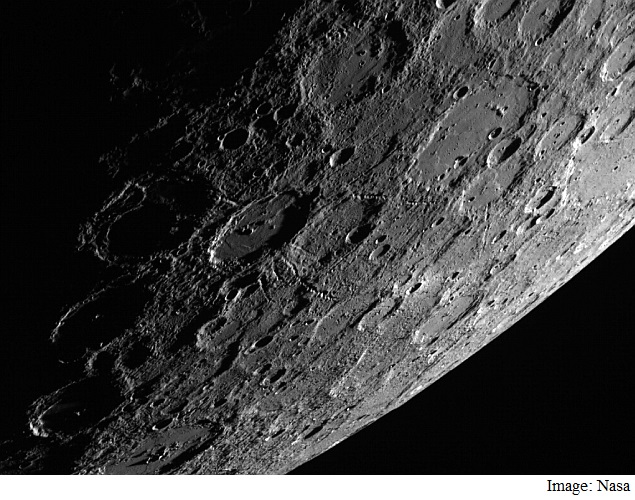- Home
- Science
- Science News
- Nasa's Mercury 'Messenger' Mission Given Last Lease of Life
Nasa's Mercury 'Messenger' Mission Given Last Lease of Life

Nasa engineers have lifted the orbit of the Mercury probe - currently operating on an extended mission and almost out of fuel - and delayed its inevitable impact into Mercury's surface by up to a month.
Launched in August 2004, the $450 million MErcury Surface, Space ENvironment, GEochemistry and Ranging (Messenger) mission is currently orbiting our solar system's innermost planet.
In March 2011, Messenger became the first spacecraft to orbit Mercury.
"We decided on a strategy that includes five manoeuvres in as many weeks to keep the spacecraft within a tight altitude range of 5 to 39 km above the surface of Mercury at closest approach," said Jim McAdams, Messenger mission's design lead engineer from Johns Hopkins University in a statement.
The next such manoeuvre is scheduled for April 2.
With these manoeuvres, Messenger could keep observing Mercury till April 30.
After this, the probe will succumb to the force of the Sun's gravity and spiral down to its doom on Mercury, Space.com reported.
So far, the probe has yielded the best-ever maps of Mercury.
It also discovered carbon-containing organic compounds and water ice inside permanently shadowed craters near the rocky world's north pole.
Messenger's final days of operation will prioritise observations made by the spacecraft's magnetometer (MAG) and neutron spectrometer (NS), mission team members informed.
Catch the latest from the Consumer Electronics Show on Gadgets 360, at our CES 2026 hub.
Related Stories
- Samsung Galaxy Unpacked 2025
- ChatGPT
- Redmi Note 14 Pro+
- iPhone 16
- Apple Vision Pro
- Oneplus 12
- OnePlus Nord CE 3 Lite 5G
- iPhone 13
- Xiaomi 14 Pro
- Oppo Find N3
- Tecno Spark Go (2023)
- Realme V30
- Best Phones Under 25000
- Samsung Galaxy S24 Series
- Cryptocurrency
- iQoo 12
- Samsung Galaxy S24 Ultra
- Giottus
- Samsung Galaxy Z Flip 5
- Apple 'Scary Fast'
- Housefull 5
- GoPro Hero 12 Black Review
- Invincible Season 2
- JioGlass
- HD Ready TV
- Laptop Under 50000
- Smartwatch Under 10000
- Latest Mobile Phones
- Compare Phones
- Vivo Y500i
- OnePlus Turbo 6V
- OnePlus Turbo 6
- Itel Zeno 20 Max
- OPPO Reno 15 Pro Mini 5G
- Poco M8 Pro 5G
- Motorola Signature
- Vivo Y50e 5G
- Lenovo Yoga Slim 7x (2025)
- Lenovo Yoga Slim 7a
- Realme Pad 3
- OPPO Pad Air 5
- Xiaomi Watch 5
- Huawei Watch 10th Anniversary Edition
- Acerpure Nitro Z Series 100-inch QLED TV
- Samsung 43 Inch LED Ultra HD (4K) Smart TV (UA43UE81AFULXL)
- Asus ROG Ally
- Nintendo Switch Lite
- Haier 1.6 Ton 5 Star Inverter Split AC (HSU19G-MZAID5BN-INV)
- Haier 1.6 Ton 5 Star Inverter Split AC (HSU19G-MZAIM5BN-INV)

















